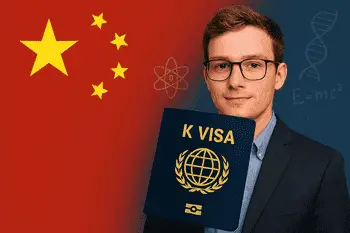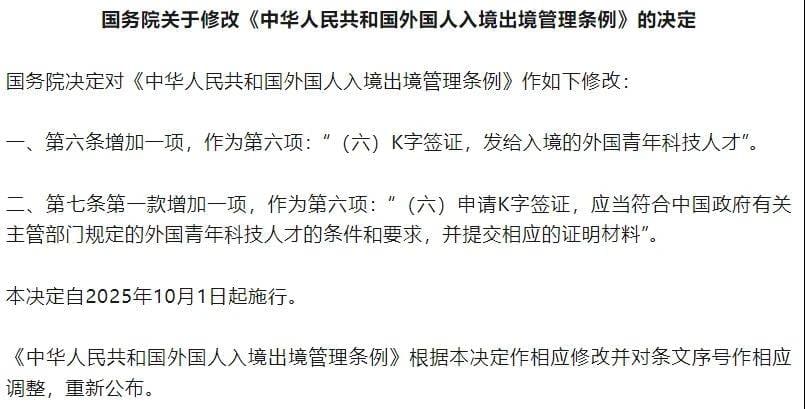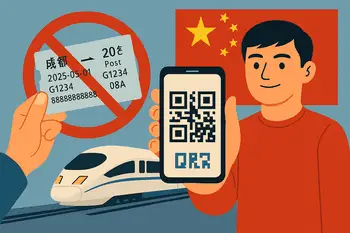
China just made big news. They created a brand new visa type. It’s called the K visa.
This visa is for young people who work in science and tech.

The K visa starts on October 1, 2025. It’s part of China’s plan to bring in smart people from around the world.
China wants to boost its tech industry. They need fresh talent to help them grow.
Who Can Get a K Visa?
The K visa is only for certain people. Here’s who can apply:
| Requirement | Details |
|---|---|
| Age | Young professionals (exact age limit TBA) |
| Education | Bachelor’s degree or higher in STEM fields |
| University | Must graduate from recognized institution |
| Work Type | Education, research, or STEM professional roles |
What is STEM? STEM means Science, Technology, Engineering, and Math. This includes fields like computer science, biology, physics, and engineering.
What Makes the K Visa Special?
The K visa is different from other Chinese visas. Here’s what makes it unique:
| Feature | K Visa | Other Visas |
|---|---|---|
| Job Offer | Not required | Usually required |
| Invitation | Not needed | Often needed |
| Application | Simplified process | More complex |
| Processing | Faster approval | Longer wait times |
| Flexibility | Can extend easily | Limited extensions |
How to Apply for a K Visa
The exact steps are still being worked out. But here’s what we know so far:
| Step | Action | Details |
|---|---|---|
| 1 | Check qualifications | Verify age, degree, and university |
| 2 | Gather documents | Diploma, transcripts, passport, etc. |
| 3 | Apply online | Use COVA system at visa.mfa.gov.cn |
| 4 | Submit to embassy | Find your local Chinese embassy |
Required Documents:
- Valid passport
- University diploma and transcripts
- Proof of STEM background
- Passport photos
- Completed application form
- Visa application fee
Which Countries Can Apply?
The K visa is open to people from many countries. China wants talent from all over the world.
| Region | Countries |
|---|---|
| North America | United States, Canada |
| Europe | All EU countries, UK, Switzerland, Norway |
| Asia-Pacific | Australia, New Zealand, Japan, South Korea |
| South Asia | India, Pakistan, Bangladesh, Sri Lanka |
| Others | Many other countries with recognized universities |
For a complete list, check the Chinese Ministry of Foreign Affairs website.
Benefits of the K Visa
Getting a K visa gives you many advantages:
Career Benefits:
- Access to China’s growing tech scene
- Work with leading Chinese companies
- Join research projects at top universities
- Network with other international talent
Personal Benefits:
- Learn Chinese language and culture
- Experience life in modern China
- Build international experience
- Develop new skills
Financial Benefits:
- Competitive salaries in tech
- Lower cost of living than many Western cities
- Opportunities for career growth
What Fields are Included?
The K visa covers many STEM areas:
| Field | Specific Areas |
|---|---|
| Science | Biology, Chemistry, Physics, Environmental Science |
| Technology | Computer Science, Software Engineering, AI, IT |
| Engineering | Mechanical, Electrical, Civil, Chemical, Aerospace |
| Mathematics | Pure Math, Applied Math, Statistics, Data Science |
| Other STEM | Materials Science, Biotechnology, Robotics |
For official field classifications, visit the China Association for Science and Technology.
Important Things to Know
Before you apply, keep these points in mind:
Timeline:
- K visa starts October 1, 2025
- Plan your application early
- Processing may take several weeks
Requirements May Change:
- China is still finalizing details
- Check official sources for updates
- Requirements might vary by country
Language:
- Chinese language skills help but aren’t required
- Many tech companies use English
- Learning basic Chinese is recommended
Tips for Success
Here are ways to improve your chances:
Strengthen Your Application:
- Get letters from professors
- Show your research work
- Highlight tech projects
- Prove your STEM background
Prepare for China:
- Learn about Chinese culture
- Research cities where you want to work
- Connect with other expats online
- Plan your first few weeks
Network Early:
- Join online communities
- Contact Chinese universities
- Reach out to tech companies
- Find mentors in your field
Challenges to Consider
The K visa sounds great, but there are some challenges:
Cultural Differences:
- Work culture is different
- Communication styles vary
- Building relationships takes time
Legal Considerations:
- Understand Chinese work laws
- Know your rights as a worker
- Protect your intellectual property
Living Adjustments:
- Language barriers
- Different food and customs
- Air quality in some cities
- Internet restrictions
Cities to Consider
China has many great cities for STEM workers:
| City | Best For | Living Cost | Language Barrier |
|---|---|---|---|
| Beijing | Universities, research | High | Medium |
| Shanghai | International business | High | Low |
| Shenzhen | Tech startups, innovation | Medium | Medium |
| Guangzhou | Manufacturing, trade | Medium | High |
| Hangzhou | E-commerce, tech | Medium | Medium |
| Chengdu | Gaming, software | Low | High |
City Resources:
- Beijing: beijing.gov.cn
- Shanghai: shanghai.gov.cn
- Shenzhen: sz.gov.cn
- For job opportunities: zhaopin.com or 51job.com
Next Steps
If you’re interested in the K visa:
| Action | Resources |
|---|---|
| Official Info | Chinese Embassy in your country |
| University Recognition | Chinese Service Center for Scholarly Exchange |
| Job Market Research | LinkedIn China, Boss Direct |
| Expat Communities | Expat.com China, The Beijinger |
| Language Learning | HSK Test, Duolingo Chinese |
Key Preparation Steps:
- Research More: Follow official sources and embassy websites
- Prepare Documents: Gather certificates and get translations
- Learn About China: Study culture and learn basic Mandarin
- Stay Updated: Watch for official K visa announcements
Conclusion
China’s new K visa is a big opportunity. It opens doors for young STEM talent worldwide. The visa makes it easier to work and study in China.
If you’re young and work in science or tech, this could be your chance. China is investing heavily in innovation. They need people like you to help them succeed.
The process starts October 1, 2025. Start preparing now. Do your research. Get your documents ready. This could be the start of an exciting new chapter in your career.
Important Reminders:
- Details are still being finalized
- Check official Chinese government sources regularly
- Contact your local Chinese embassy or consulate for updates
The future of tech is global. China wants to be part of that future. With the K visa, you could be part of it too.
Additional Resources:
- China Daily – Latest news about China
- Study in China – Educational opportunities
- China Briefing – Business and legal updates
- That’s Online – Expat lifestyle and news



